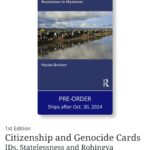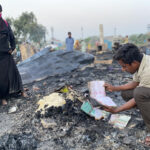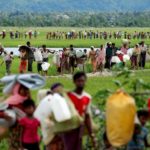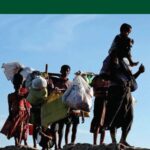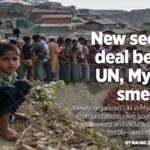Articles by Natalie Brinham
We found 12 results.
Citizenship & Genocide Cards
Natalie Brinham - TRANSCEND Media Service,
14 Oct 2024
This book draws on Rohingya oral histories and narratives about Myanmar’s genocide and ID schemes to critique prevailing international approaches to legal identities and statelessness. It examines the multiple uses of state issued ID cards and registration documents in producing statelessness and facilitating genocide.
→ read full articleRefugee Experiences of Identity Documents and Digitisation in India and Myanmar
Natalie Brinham and Ali Johar | Forced Migration Review – TRANSCEND Media Service,
3 Jun 2024
May 2024 – Drawing on the authors’ joint activism on the rights of refugees and stateless people in India and Myanmar, this article considers how digital ID systems can be used to exclude minorities.
→ read full articleThe Statelessness Pandemic
Laura van Waas and Natalie Brinham | Project Syndicate – TRANSCEND Media Service,
18 Oct 2021
15 Oct 2021 – Over time, denaturalization has rightly come to be seen as a violation of human rights. But, as recent histories of the problem show, the international community still faces the same conundrum that it did a century ago, when droves of newly stateless people appealed to it for protection. At least 15 million people today are stateless, and millions more are threatened with national exclusion. The issue of statelessness thus demands urgent attention, as do works of history that shed light on the problem.
→ read full articleLending Legitimacy to a Murderous Military: What Is in the “Stateless” Label for Rohingyas?
Natalie Brinham and Ali Johar | University of Melbourne - TRANSCEND Media Service,
4 Oct 2021
Oct 2021 – Critiquing the widely accepted understanding of “statelessness” as a rights claim, the authors call our attention to the ways in which labelling the Rohingya ethnic community as stateless undermines belonging and legitimises the power of the Myanmar military to exclude.
→ read full articleLocked in and Locked out: The Impact of Digital Identity Systems on Rohingya Populations in Myanmar
Natalie Brinham, et al. | Institute on Statelessness and Inclusion/UN Special Rapporteur on Racism - TRANSCEND Media Service,
7 Dec 2020
November 2020 – This paper sheds urgent light on how the digitization of identity stands to worsen the human rights situation for the Rohingya, who the global community has failed time and time again. It also centres Rohingya perspectives on the action necessary to ensure that technological innovation does not become a cover for severe discriminatory exclusion on the basis of ethnicity and religion.
→ read full articleRohingya Poets Turn Words into Art of Resistance
Natalie Brinham, Yuriko Cowper-Smith, and Maung Zarni | Anadolu Agency – TRANSCEND Media Service,
12 Aug 2019
7 Aug 2019 – Rohingya poets featured in an anthology, I am Rohingya, write with an urgency and passion of genocide survivors. They reclaim their experience, their group identity and their agency from the victimhood that has framed their existence for so long.
→ read full articleWhen Identity Documents and Registration Produce Exclusion: Lessons from Rohingya Experiences in Myanmar
Natalie Brinham | London School of Economics and Political Science – TRANSCEND Media Service,
20 May 2019
10 May 2019 – State practices relating to registration and documentation since 1978 have played a significant part in multiple mass state-directed expulsions to Bangladesh . Such practices include the confiscation, destruction, nullification and targeted non-issuance of identity documents. Registration processes have become increasingly repressive, coercive and abusive since the mid-1990s, making survival for Rohingya in Myanmar more and more difficult. This bureaucratic cleansing has produced a steady stream of people out of the country since the 1990s.
→ read full article“Genocide Cards”: Rohingya Refugees on Why They Risked Their Lives to Refuse ID Cards
Natalie Brinham | Open Democracy – TRANSCEND Media Service,
22 Oct 2018
21 Oct 2018 – Wary of the past, Rohingya have frustrated the UN’s attempts to provide them with documentation. “These cards make us into foreigners… We are already citizens of this country.”
→ read full articleNew Secretive Deal between UN, Myanmar Smells Foul
Maung Zarni and Natalie Brinham - Andalou Post [Turkey],
20 Jun 2018
Newly-organized UN in Myanmar has shelved organization’s own governing principles of transparency and inclusivity, as evidenced by freshly-inked MOU with Myanmar.
→ read full articleReworking the Colonial-Era “Indian Peril”: Myanmar’s State-directed Persecution of Rohingyas and Other Muslims
Maung Zarni & Natalie Brinham - TRANSCEND Media Service,
22 Jan 2018
Myanmar’s transition from the military dictatorship to the adoption of a Chinese model of great commercial opening with a calibrated political liberalization has one unintended consequence for the military-controlled-government: ugly things get exposed. All of a sudden, the dark secrets of this predominantly Buddhist nation of 51 million people with diverse ethnic and religious backgrounds are laid bare for all to witness.
→ read full articleWaves of Genocidal Terror against Rohingyas by Myanmar and the Resultant Exodus Since 1978
Maung Zarni and Natalie Brinham | Middle East Institute – TRANSCEND Media Service,
20 Nov 2017
14 Nov 2017 – This essay aims to highlight the scope and rhythmic nature of Burma’s persecution of Rohingyas and the devastating impact on the Rohingya population. First, it sets out to describe and help readers understand the evolving pretexts given by the successive Burmese governments and the methods of group destruction and resultant waves — five in total — of the outflow of Rohingyas in large number. Then it attempts to offer an interpretive framework within which this cycle of violence-exodus-lull is best understood.
→ read full articleThe Trafficking of Stateless Rohingya: A Problem of Organised Crime or State Crime?
Natalie Brinham – London International Development Centre,
31 Aug 2015
In 2013 Natalie Birnham met and interviewed a Rohingya survivor, named Jamal, in an above-shop office of a local CBO in Kuala Lumpur. He recounted his journey fleeing from Western Myanmar/Burma to Malaysia.
→ read full article